Border crossing.
We used to cross borders every month, sometimes several times a month, but it is approaching a year since we arrived in Greece.
That was a worry. You’re only allowed to have a vehicle in Greece for six months before you re-register it. Friends regularly sent us articles about cars being impounded at the border, and huge fines being imposed for over-staying.
At the border there were plenty of Covid related concerns too. Some Polish travellers were only allowed to transit the country on a defined route with time limits, that would scupper our plans.
As it was two tired Wanderers approached the border bearing big smiles with all documents at the ready.
There was a quick check, a look inside the van, sweet words to Polly, and suddenly we were being waved on.
We could have cried. Neither of us admitted to the other how worried we were.
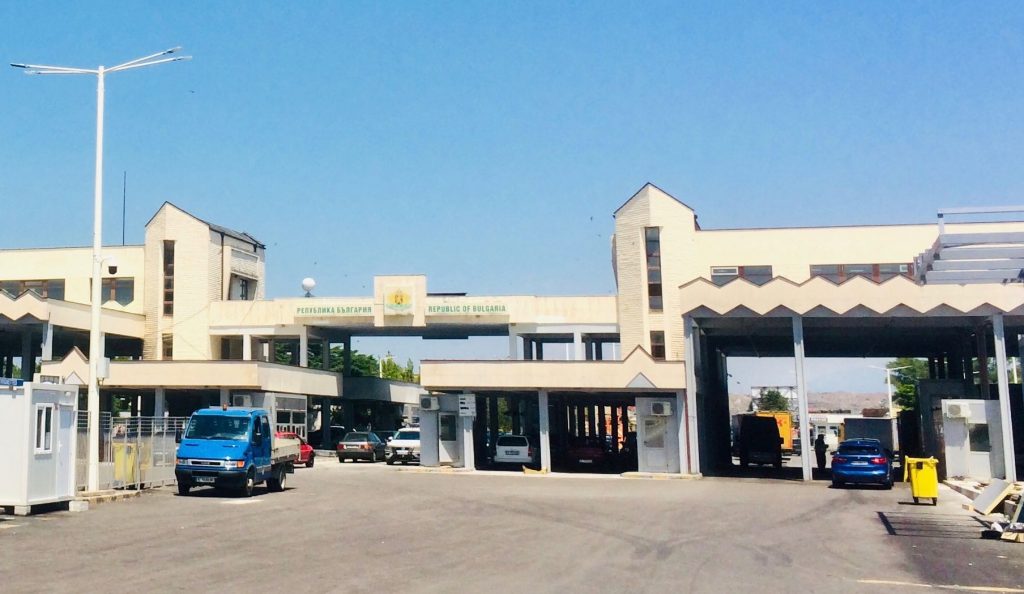
Border crossing should never be a blasé affair.
I concentrate on absorbing everything that’s different either side of the fought over line that was drawn in some meeting decades or even centuries ago.
This is a crossing rich in difference.
Greece, for all that it’s more eastern than most countries, sat in the political west, while its northern neighbours were part of the communist east.
As soon as we swung off the highway the change was obvious.
Many Bulgarian villages look like they might have been abandoned years ago, except the houses are still lived in.
Most buildings are built of a fast decomposing brick, or clay blocks. Shops can be hard to identify. Roads are a hazard of potholes and evil speed bumps.
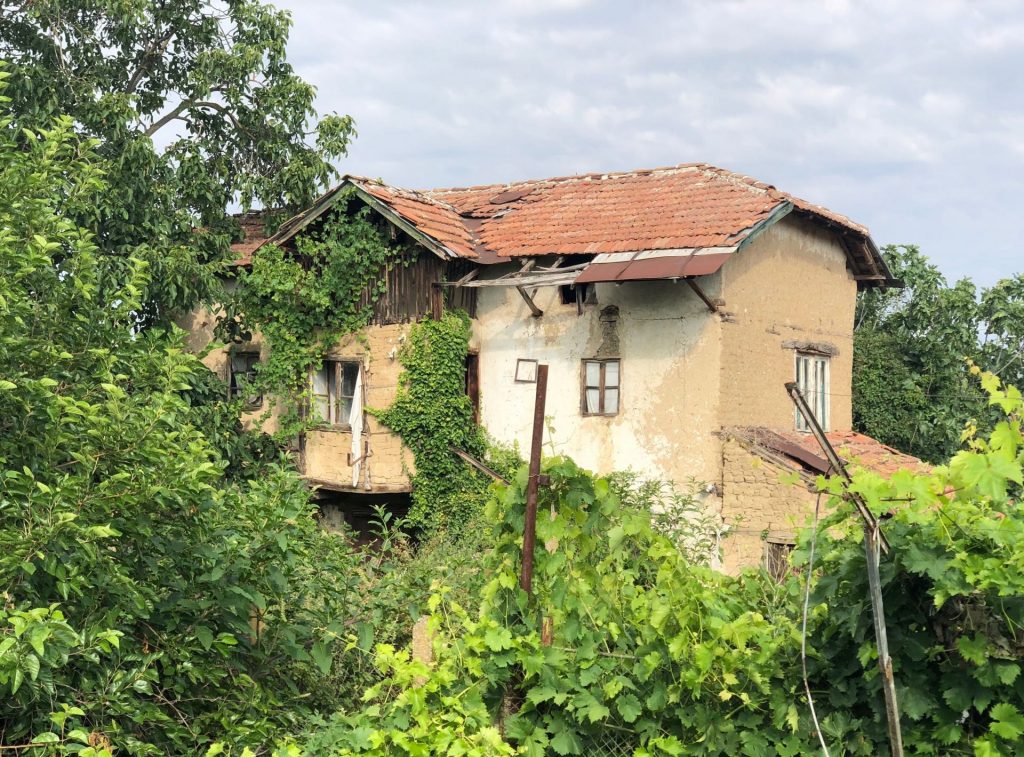
And yet.
And yet we’ve seen more flash cars in a day than we’ve seen since we left Athens. Big Mercedes, BMWs and Audis park alongside the Ladas and Moscovitchs of another age.
There needs to be a new motoring acronym of SUM Sports Utility Monster.
On the roads they vie for position among the older generation who see no need to move on from the horse and cart that has served them through their years.
This will be a country of contrast.
Bulgaria. An EU state that started further behind than even Portugal. That’s racing to catch up, where the old still rubs along with the new. Where clean money is hard to come by.
It’s a place of excitement. Bring it on.
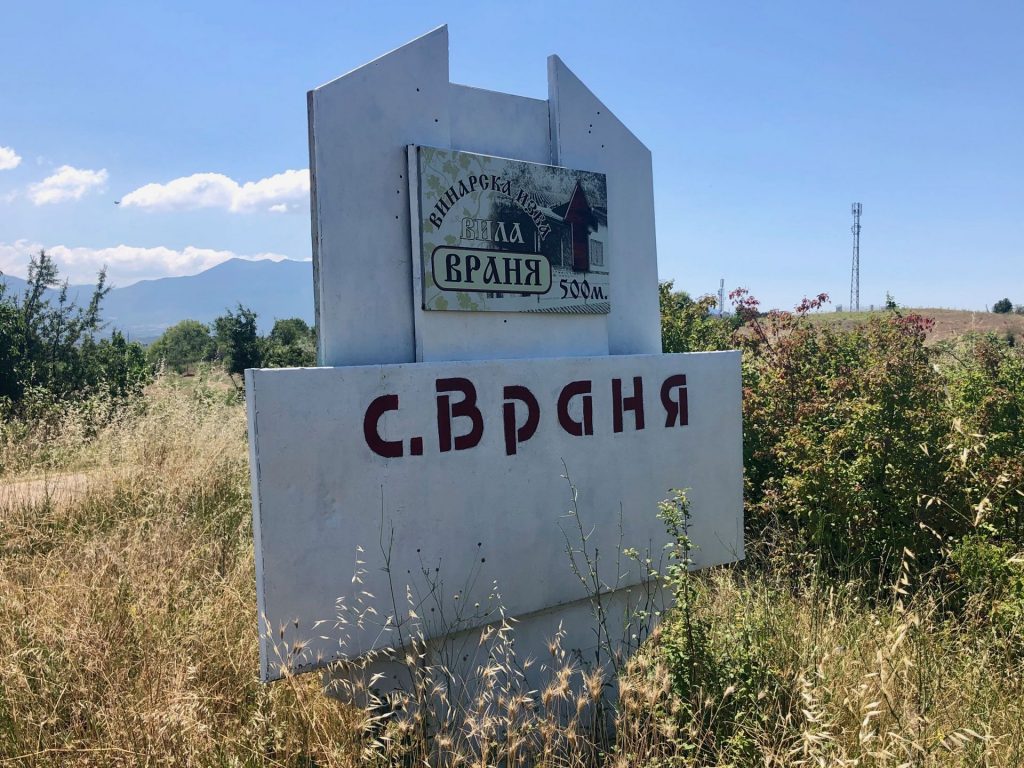
Melnik. It’s all about consumption. мелнишка лоза
The tiny village of Melnik is referred to as the country’s smallest city. I think something is lost in translation there. There are only 325 inhabitants, although once many thousands of Greeks lived here. In the Balkan wars the Greek army moved its people south and then torched the town. Yes, the Greeks did that too.
Melnik was founded on wine, and now there’s good food to be had here too.
It’s a strong red from the Melnik grape, it’s leathery, has tobacco notes, and your first reaction is likely to be a wince. I persevered under the guidance of the Shestaka vintner and soon warmed to its challenge.
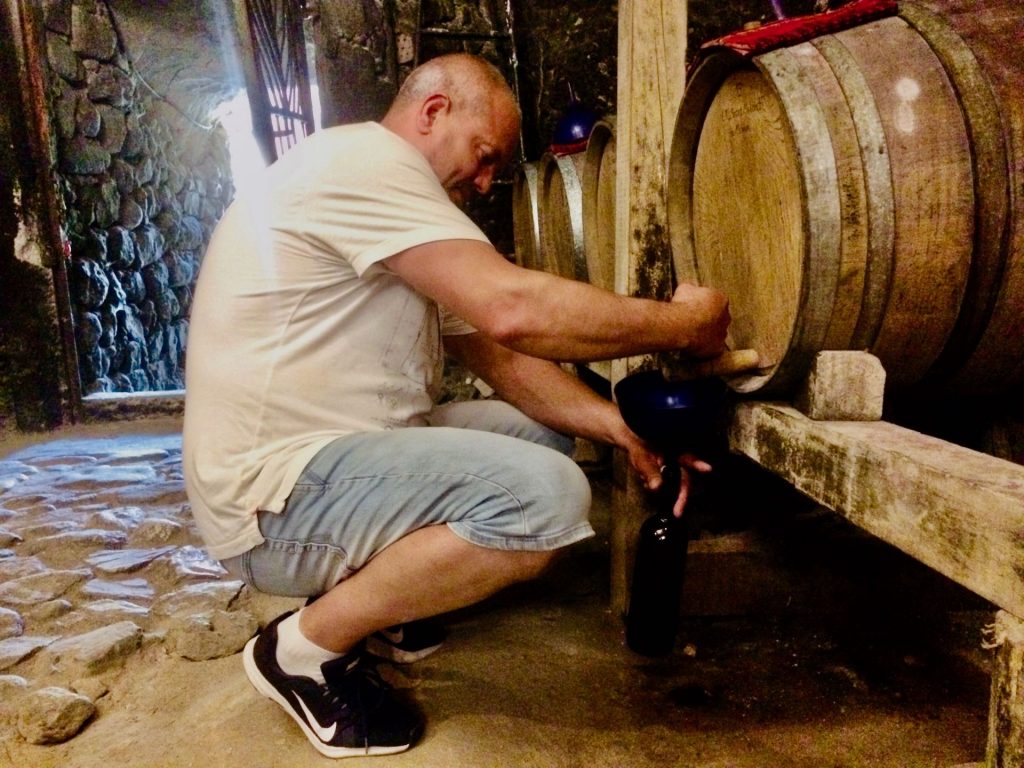
His famous six fingered brother wasn’t around, but my man drew us off a bottle, corked and labelled it, taking a few euros in payment and offering Lev in change.
Churchill ordered two barrels of Melnik red each year from Harsovo, just up the road, that’s a hellofa lot of wine. His supply continued through the war despite Bulgaria being an Axis nation.
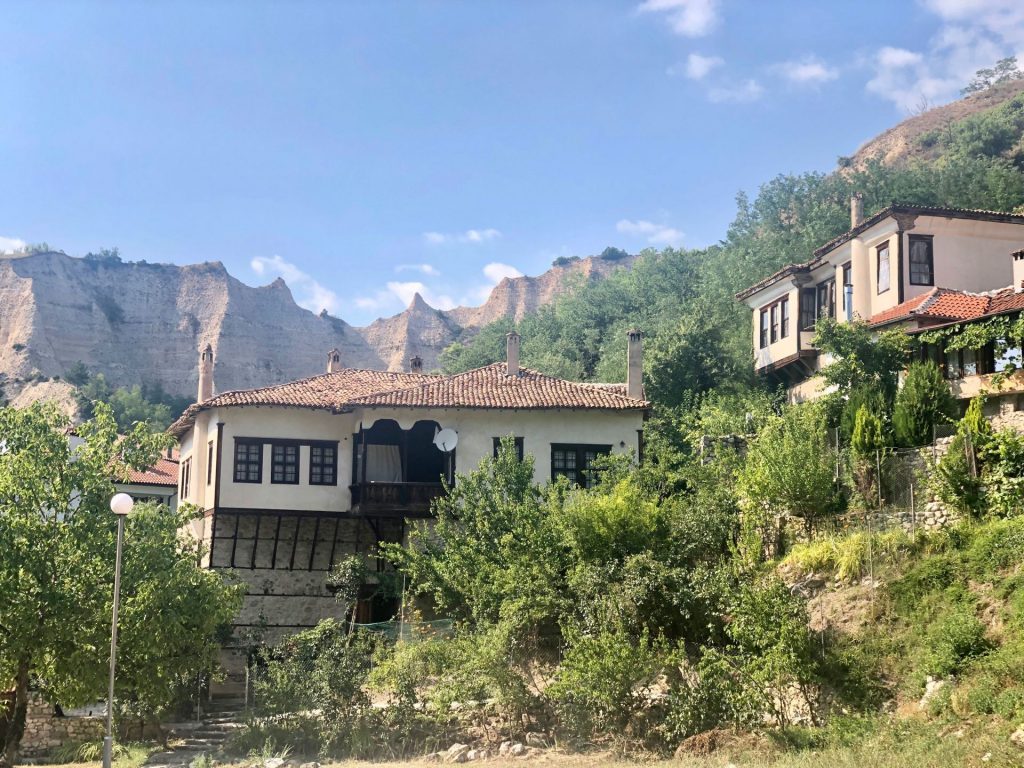
No dog at the inn.
This is a tourist town with no tourists. We stopped to sample the wines at a restaurant where the owner lamented on how the media had destroyed his business.
Everywhere is open, after all what else is there to do? But the car parks that are usually lined with coaches stand empty.
So let’s help out a bit.
We were hot, tired, drained. We needed a proper sleep. I decided that for the first time since January we’d get a room, shower, sleep well, lie in bed all morning, those things normal people do without thinking.
The first place we tried near the Rohzen Monastery was a delight. Until they decided to charge the same for the dog as for a person, and they were happy for their only business to walk away when I refused.
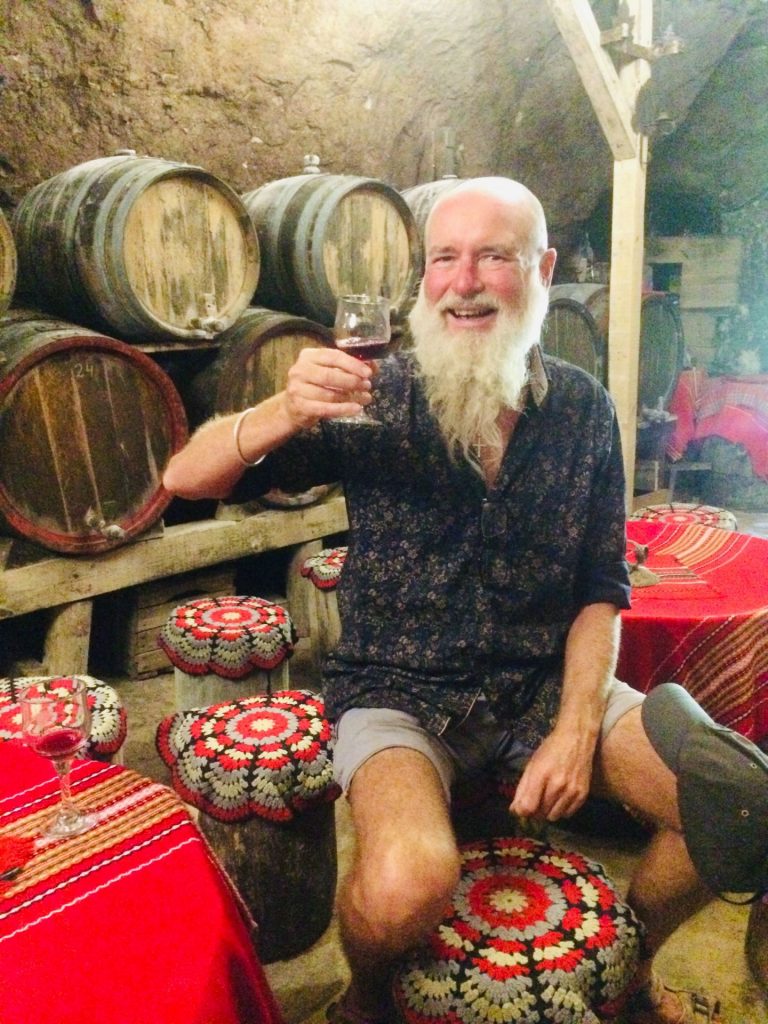
In town Minty found another delight, checked the room, agreed a price, and only when she’d dragged our weighty bag there did the receptionist come back to apologise but the owner had said “No dogs!”
I’ve managed lots of accommodation. I understand. A bad dog can wreak havoc, even a good one usually carries a lot of dirt. What they don’t know is that Polly is cleaner than most people. I’d rather accommodate her than a child.
Hey ho. We cut our losses, went for dinner, and absorbed the delightful strangeness of our surroundings. We had two big beers, a half litre of wine, chicken, chips, and a great salad for less than €15.
Then slept the sleep of the dead in the romantic setting of a dusty car park.
When friends or Instagram followers get envious of some of our great beachside vanstop photos I remind them that it takes a lot of nights in municipal car parks to get one amazing beach shot.
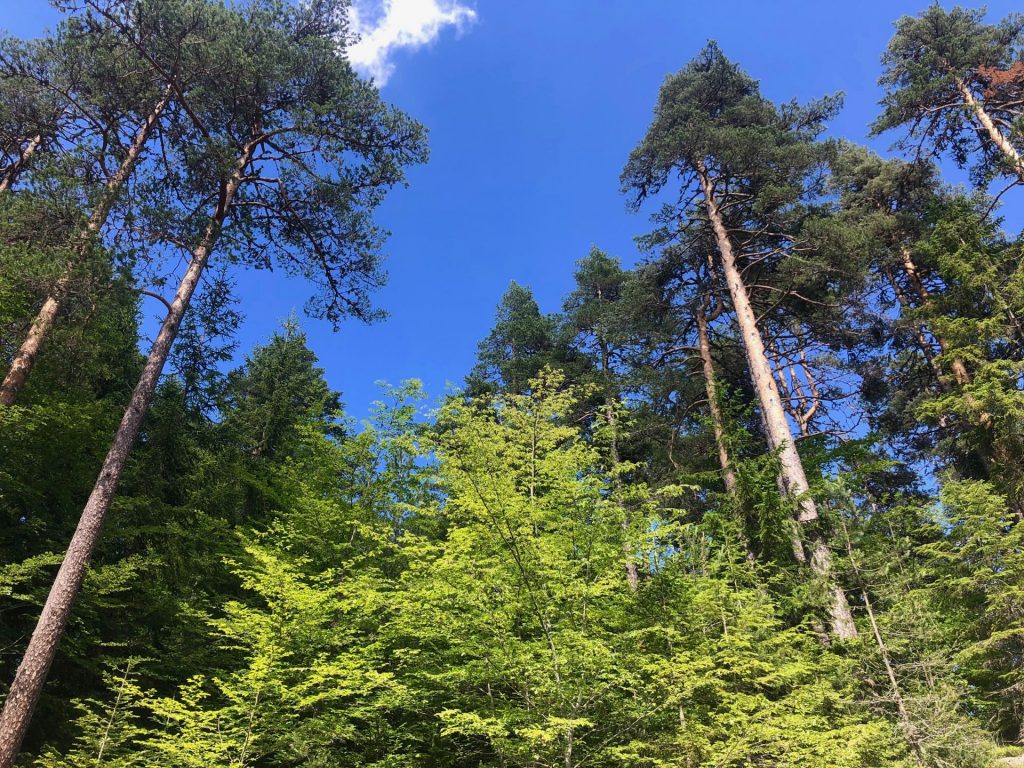
Popov Meadows.
Hey! It’s just as hot in Bulgaria as it was in Greece. How did that happen?
We needed height and boy did we get it.
The Pirin Mountains National Park crowds the south west corner of Bulgaria. After a few scratty villages the climb started.
Soon the tree cover was dense, a mix of pines and birch, their varied greens easy on the eye after the harsh light further south. There are springs every few miles, some modern, some traditional, all of them meeting places and picnic sites.
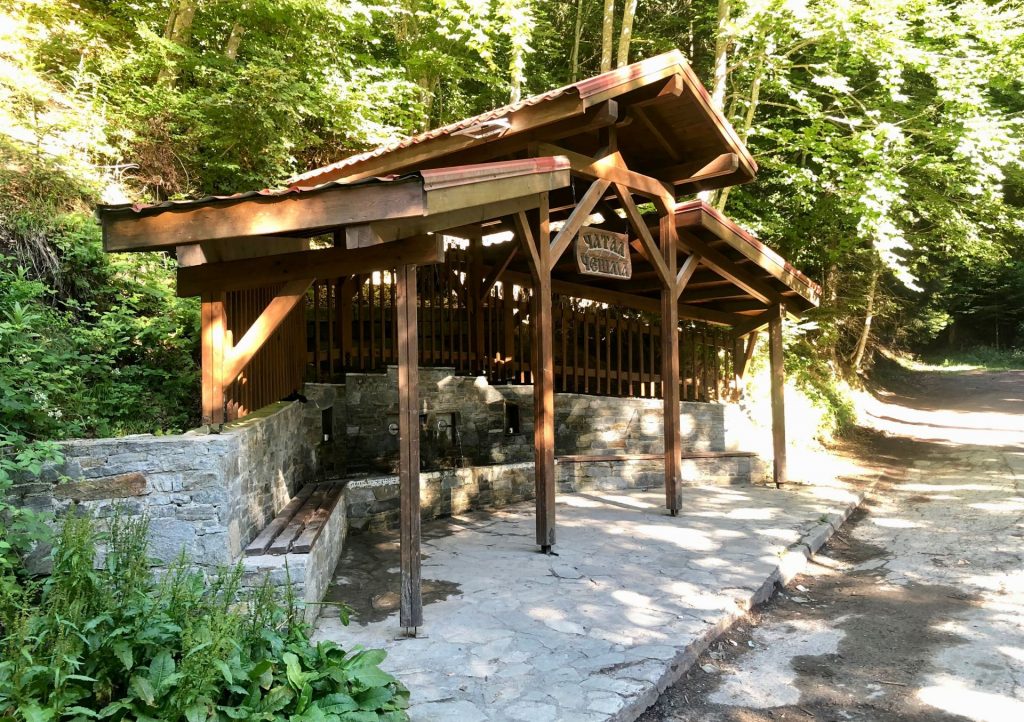
We were through 1000m in no time and still climbing fast.
Popov Meadows is at 1450m, hot during the day, but cool at night.
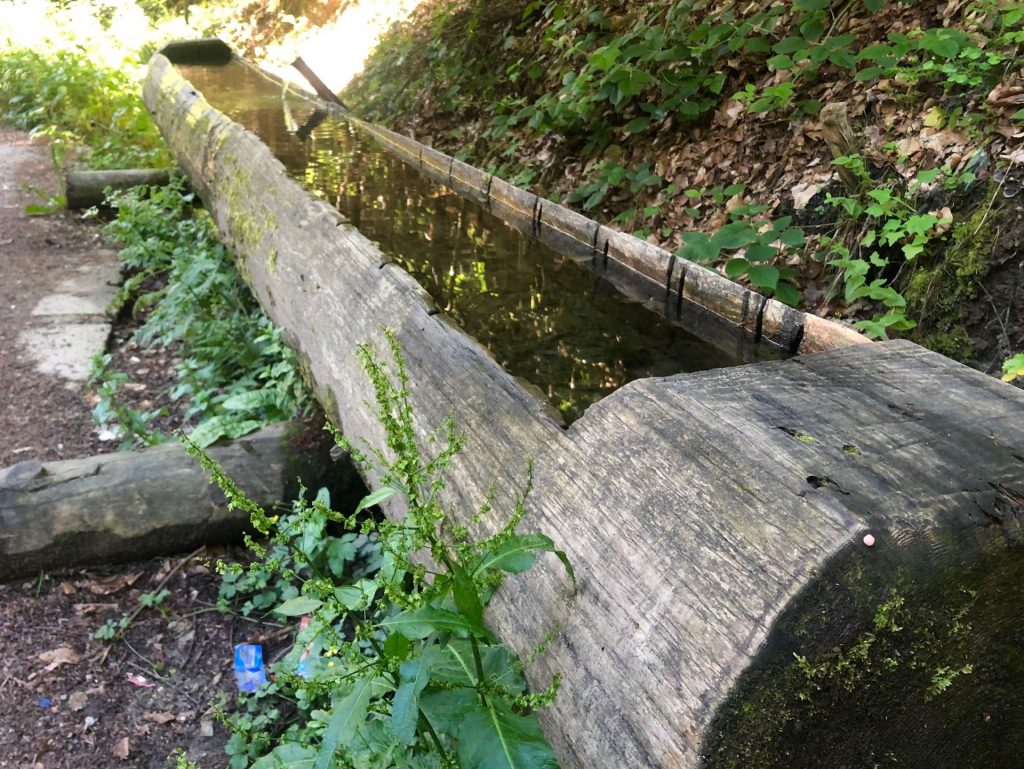
It’s a large clearing in the forest with many trails leading off. It’s carpeted with wild flowers, surrounded by trees, dotted with the red roofs of many dachas.
It’s Friday evening and the Bulgarians start to arrive soon after us in camper vans, caravans, cars with roof tents, or simply an estate car with a mattress.
There are “no fires” signs all over, and so, to a man, they each light their fire before even setting out their site. Everyone is friendly, each has a “Dobra din” for us, but so far our language stretches no further than that greeting.
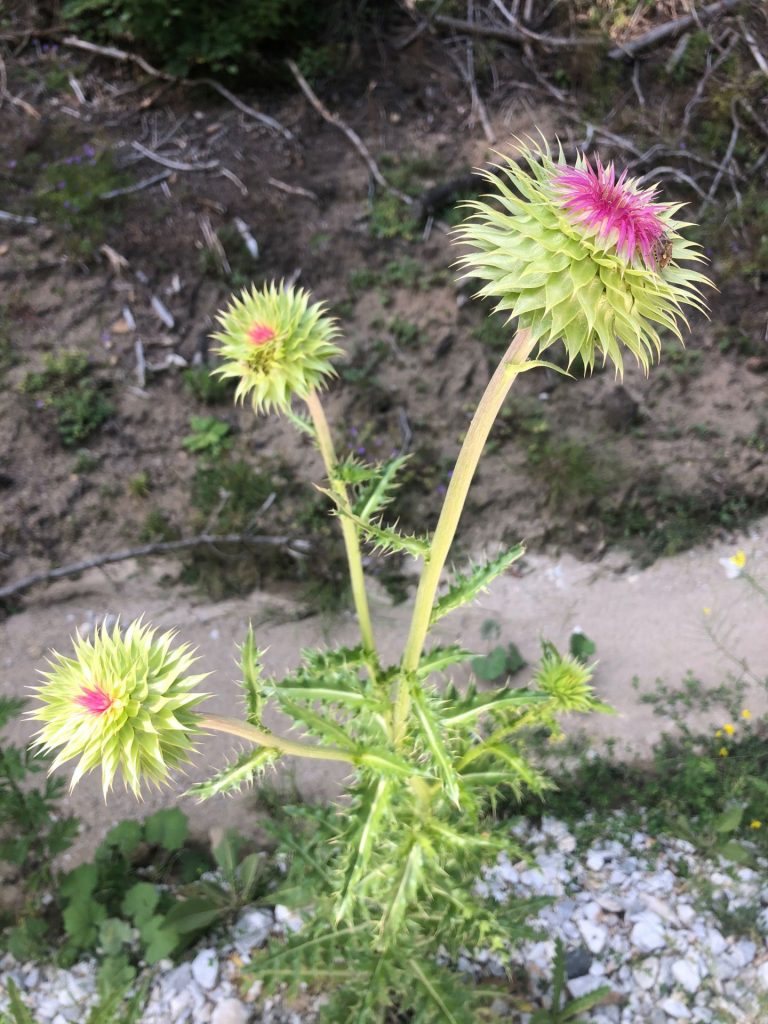
I eat micro wild strawberries on my morning Polly stroll. No bigger than a finger nail, yet packing such flavour.
The mosquitos of Greece have been exchanged for bigger flies. They’re not nice, but at least they go to sleep when the lights go out.
A young dog intent on having the last bark in an argument with his echo is eventually dragged indoors.
Silence through the night.
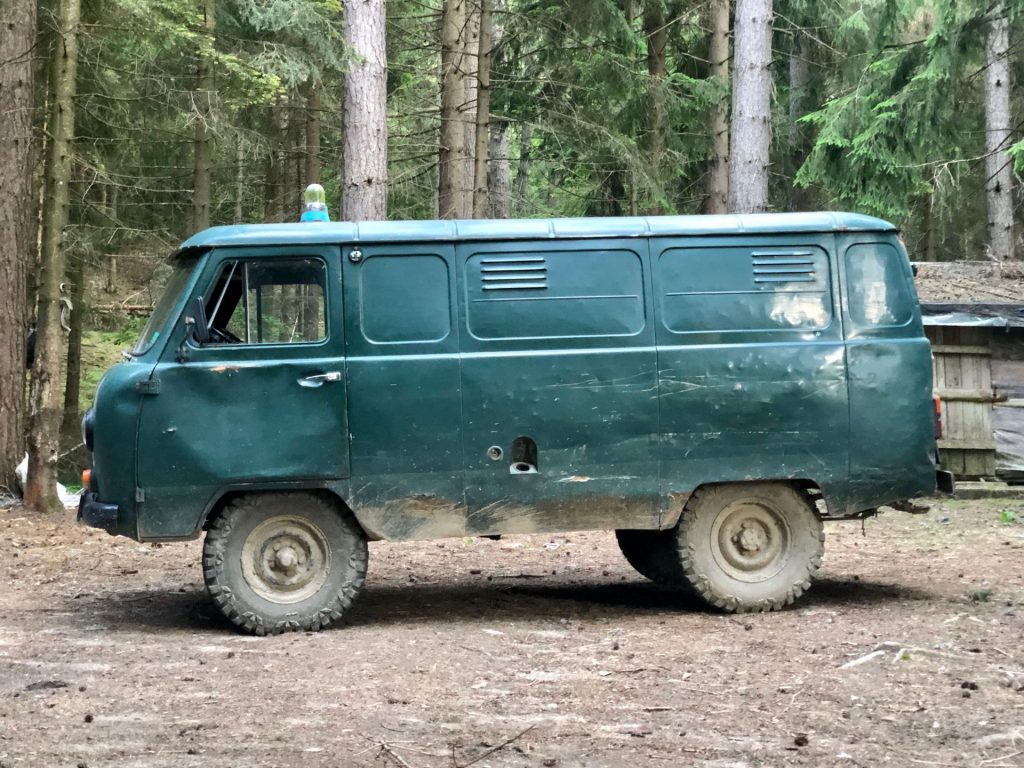
Rewilding.
I’m a big fan of letting nature do its thing.
Now that it has a cool name that people can get behind rewilding might even catch on.
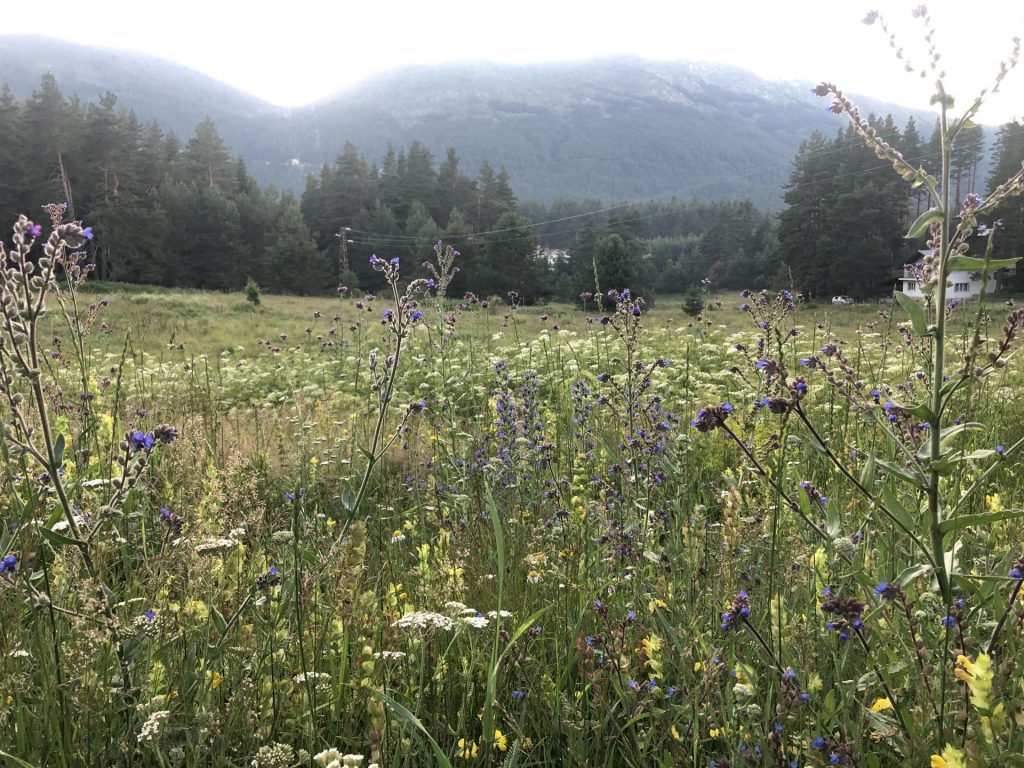
The enemy of wilding at home has long been the agricultural subsidies that pay farmers to keep land in cut grass when it’s not farmed. Everyone involved has known that the policy is destructive, but until now nothing has been done to change it.
Here wilding is not a fashionable eco-option. If land isn’t being farmed it is left, and the results are beautiful. At first glance to a British eye the landscape seems unkempt – and that’s the whole point. The variety of wild flowers around us is stunning. Some I recognise, most I don’t. The butterflies, moths, beetles, bees, paper wasps, lacewings, dragonfly derivatives and other flying beasties are amazing. These feed a diversity of birds, right up the trophic scale to eagles, that have long since abandoned our shores.
Simply seeing this thrills me. The fact that it’s cool enough in the morning to walk miles through this beauty makes my heart soar.
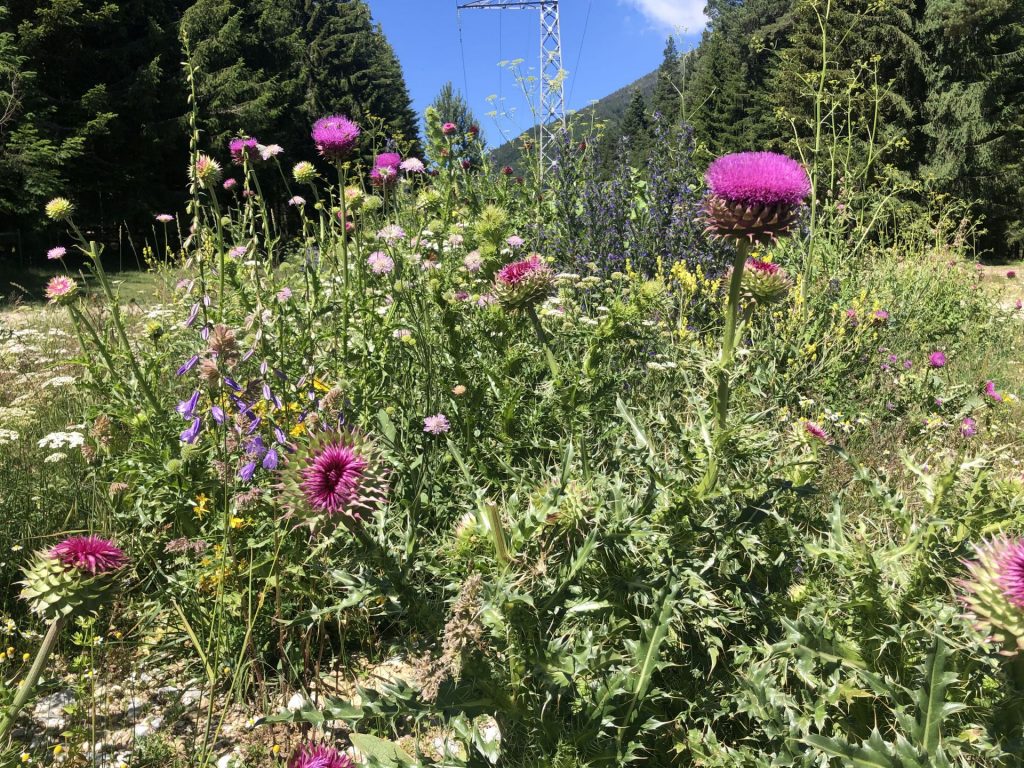
Gotse Delchev.
For all that villages are gradually being abandoned, and look truly rough, towns are often smart, at least in the centre.
Gotse Delchev is our first proper town where we need to stop to get cash.
Its wide central pedestrianized area is busy with shops and cafes, there are several banks, and we pay for parking for the first time since Germany last year (albeit a pittance).
Public buildings have distinctive Soviet concrete and glass architecture that I like, whose negative memories are finally fading.
It’s smart, but we’re not staying. We’re headed for the hills again.
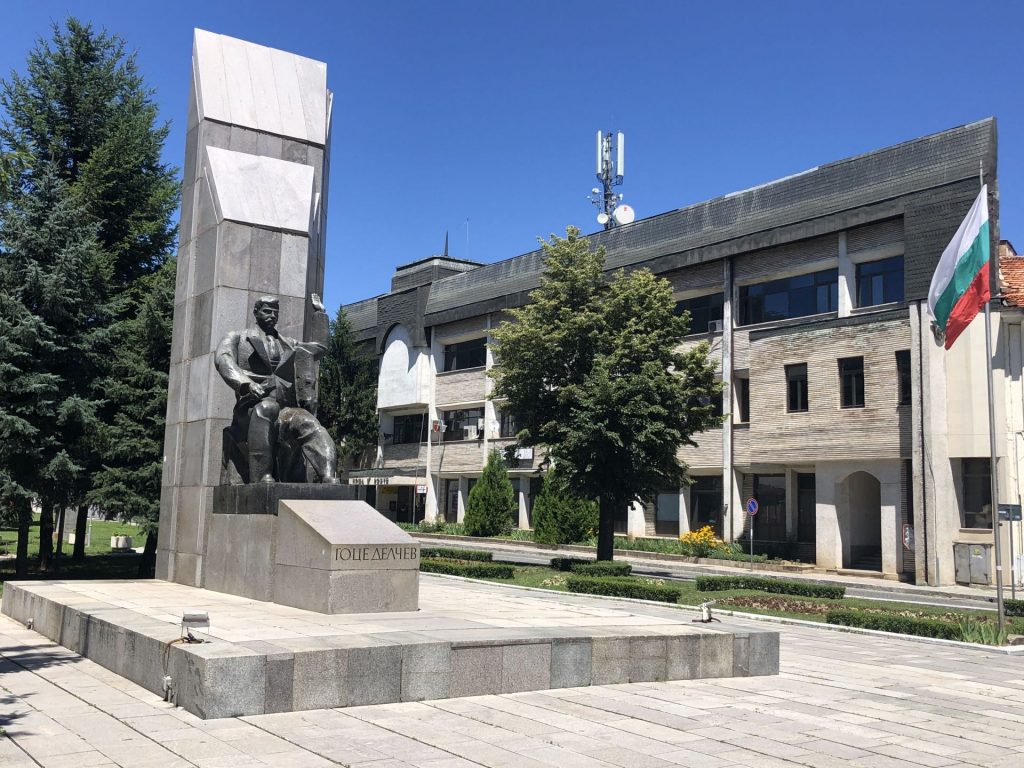
Bansko.
How curious to be driving through a country so different to what we’re used to and then come across Bansko, a ski resort like any other across the world.
It’s the gateway to Vihren, the second highest mountain in the country, and the road takes us to 1800m.
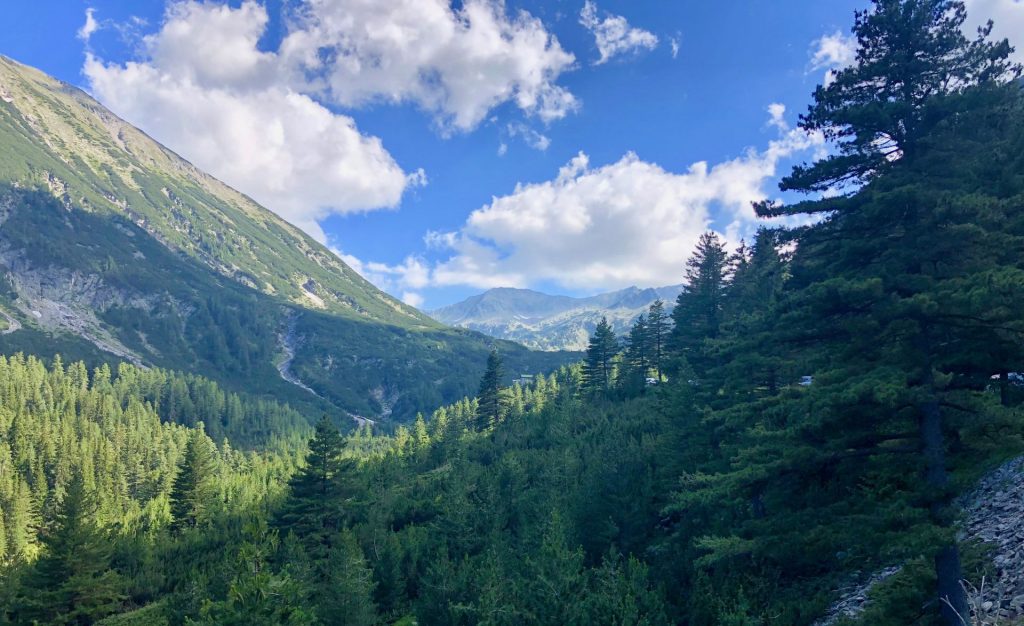
Sure, having a road up to 1800m makes it a tourist attraction, but most visitors are hikers who’ll then take on the additional 3 hour walk to its 2914m peak. On Saturday afternoon it’s busy in the car park, but ArchieVan slipped into a near flat excellent space under some pines with guaranteed morning shade.
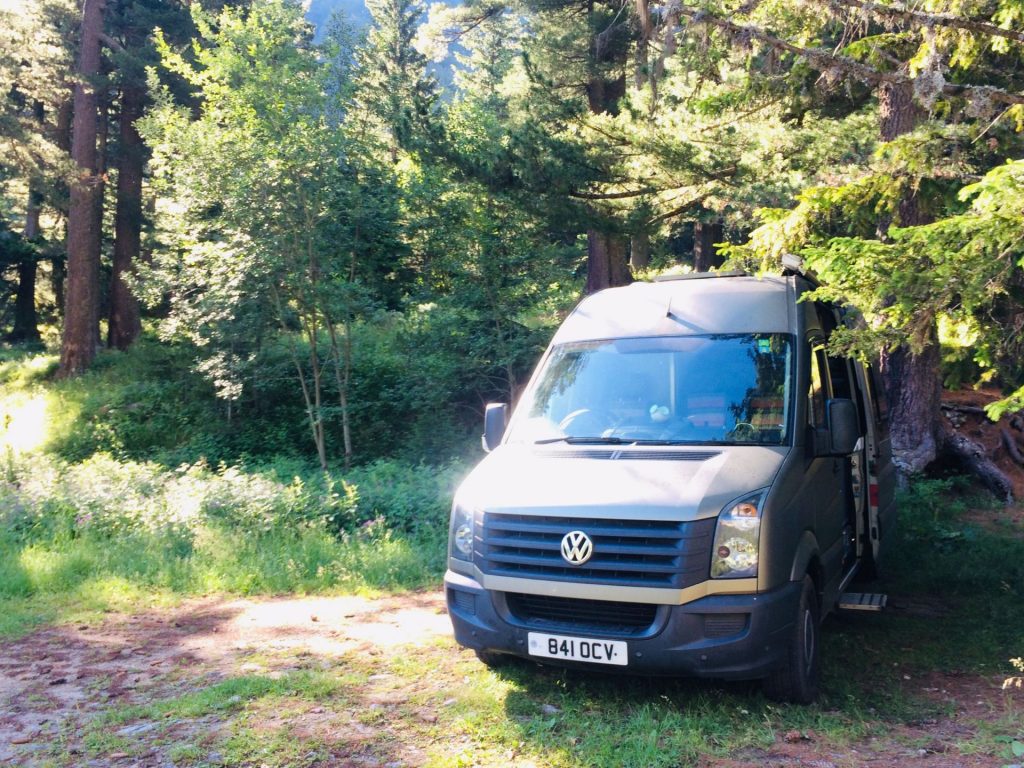
Our biggest challenge was eschewing the monster sausages at the bar, the smell was so good in the mountain air. Instead we drank their beer at just €1 for a 500ml bottle.
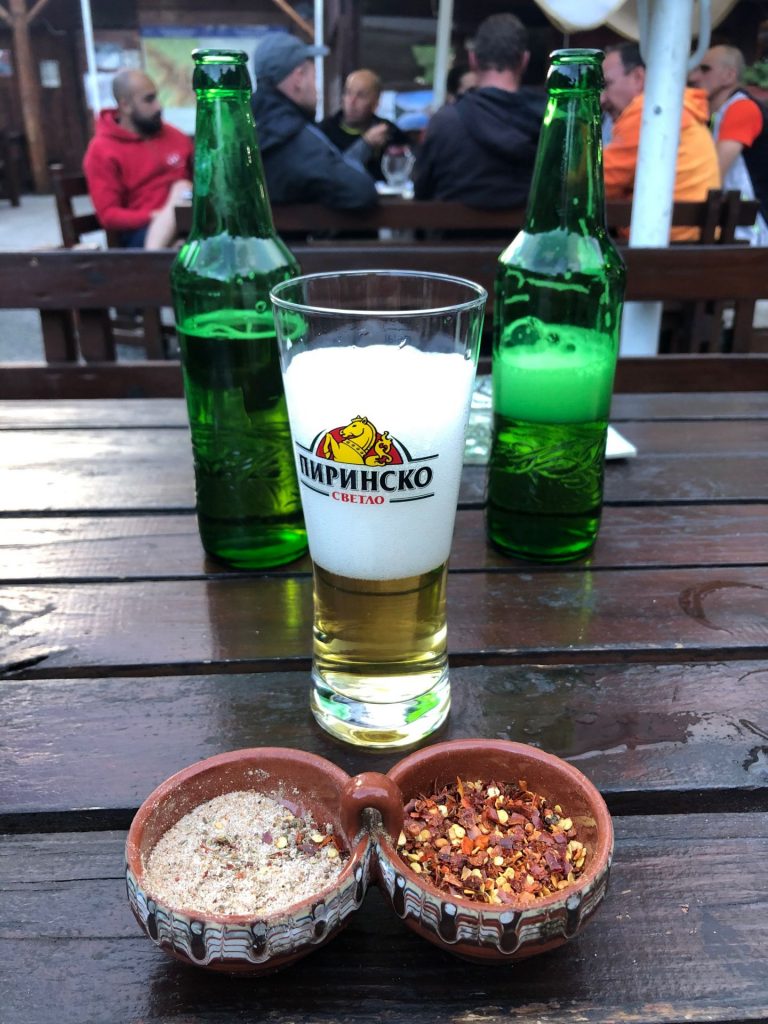
Blagoevgrad.
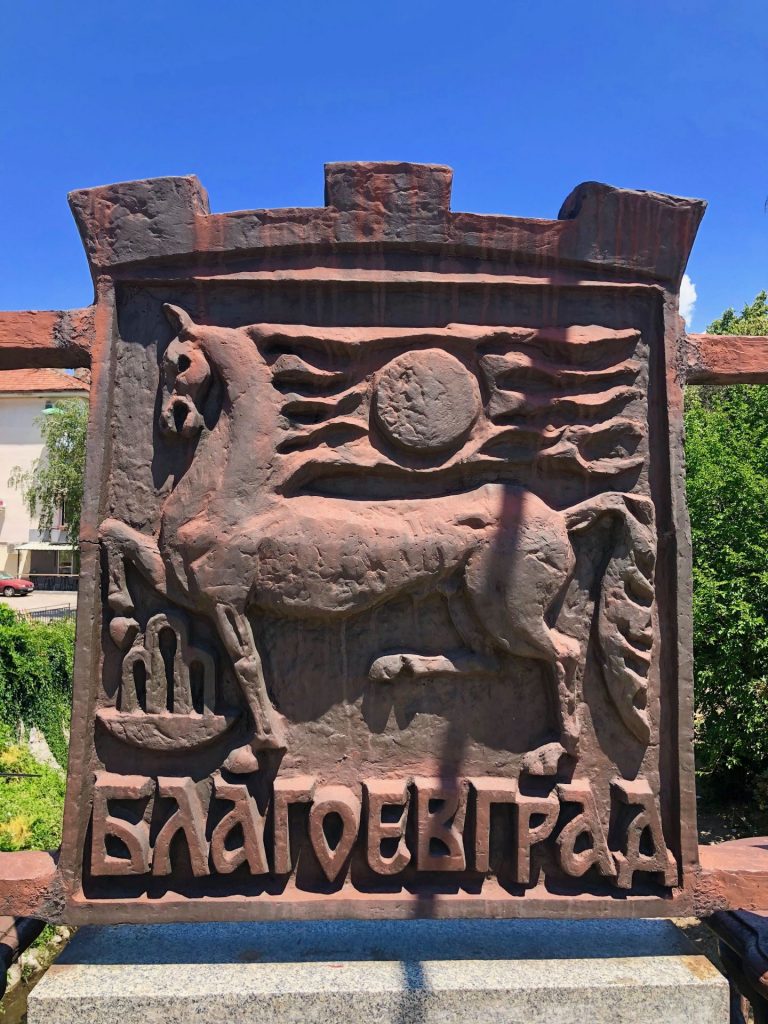
Minty had planned an excellent Pirin Mountain tour, with a town thrown in for variety.
Blagoevgrad grew on us after we’d calmed down from the experience of weaving through its tight packed streets trying to find parking.
At one point ArchieVan found himself the centre of attention as we emerged onto a huge pedestrian boulevard. No doubt there were signs to warn us not to do this. We beat a hasty retreat.
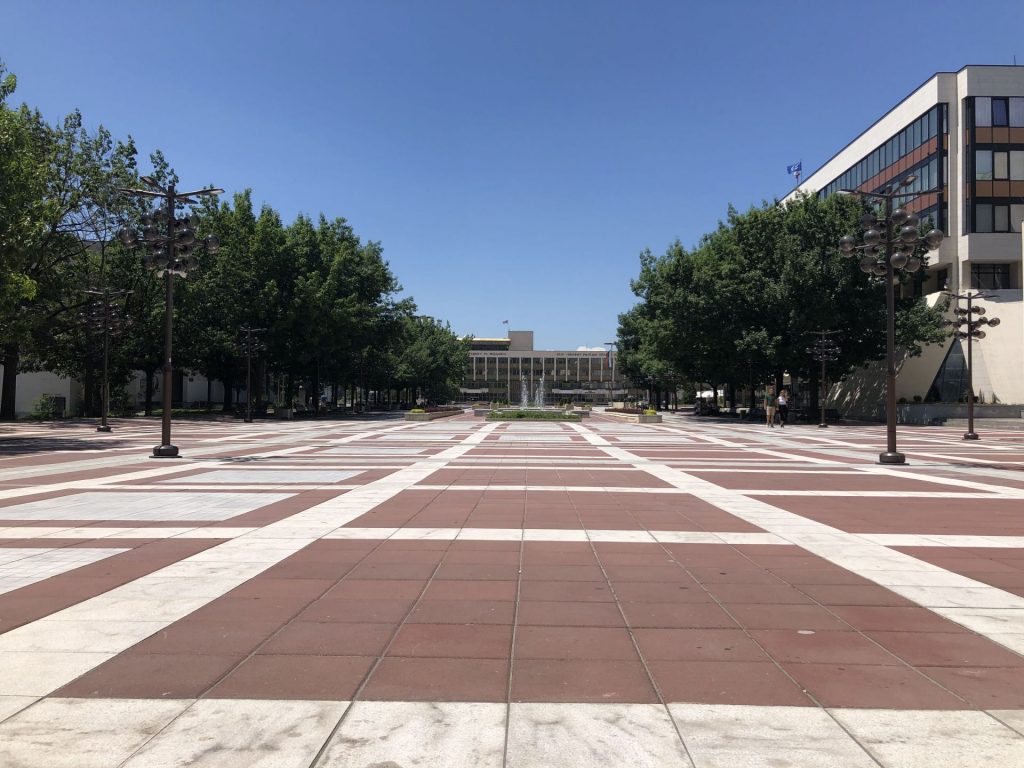
The town has a university and 1 in 4 of the population is a student. It must be buzzing in term time. Even yesterday there were far more people than I can imagine in any British town right now.
The Soviet architecture is prominent, but not oppressive. If you can look upon the Barbican in London as a thing of interest, or even beauty, then you’ll be happy here.
That centre boulevard we drove onto is on a scale that could grace a capital city, yet here it is in a small provincial town. Had I not been overheating I’d have paid more attention. Hopefully we’ll make it back and sample the mineral springs that pepper the area.
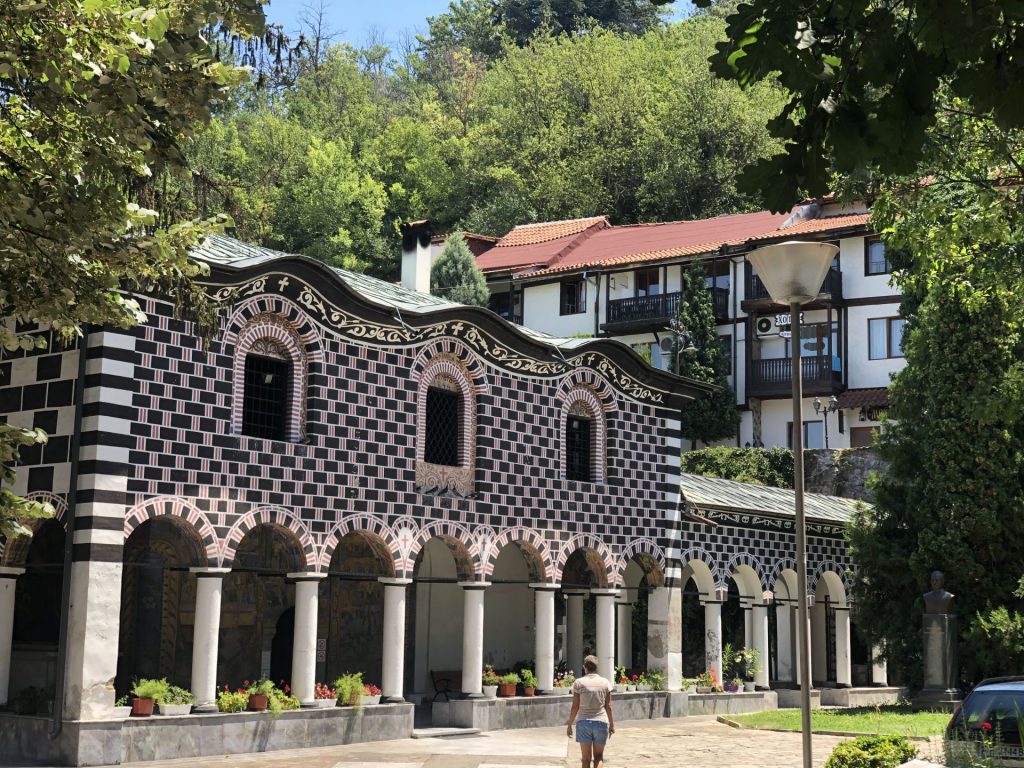
We retreated to a riverside spot for the night, clearing it of litter before we felt comfortable.
Unfortunately Bulgaria seems to have the worse rural litter problems of Europe.
As I sit outside the van typing a stork has just wandered by about ten feet away, pecking at grubs, hoping for a frog for dinner.
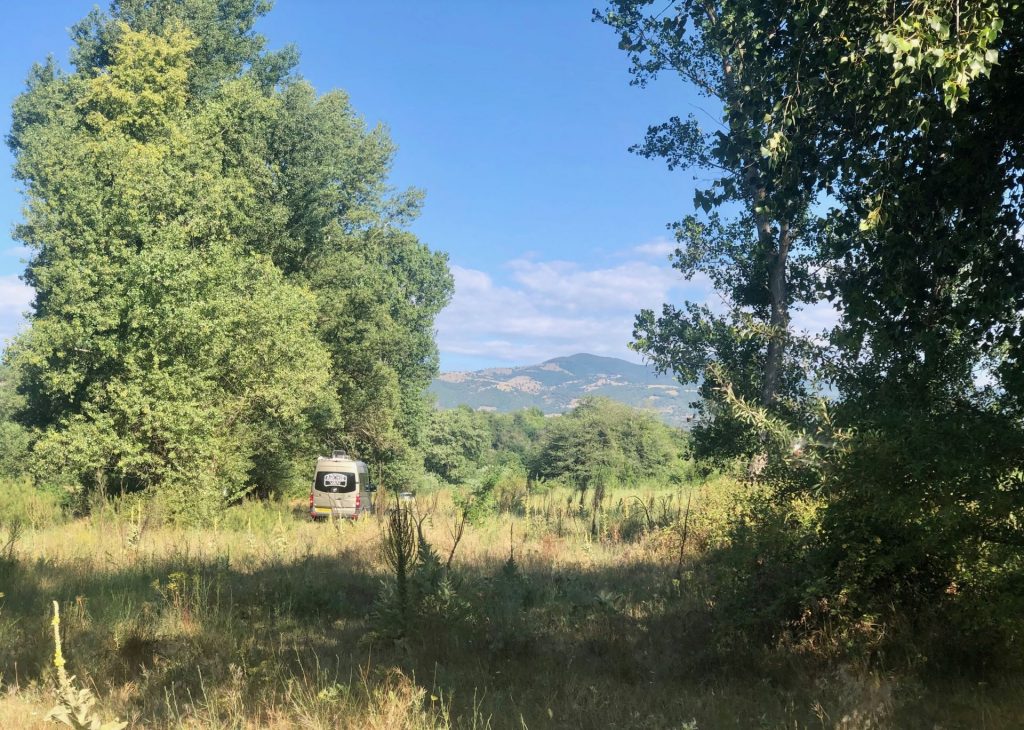
In other news… St Just.
Back at home there’s excitement in St Just where my favourite pub The Star has erected an electric fence to enforce social distancing from the bar.
Jonny McFadden. Genius!
It has put us back on the map.
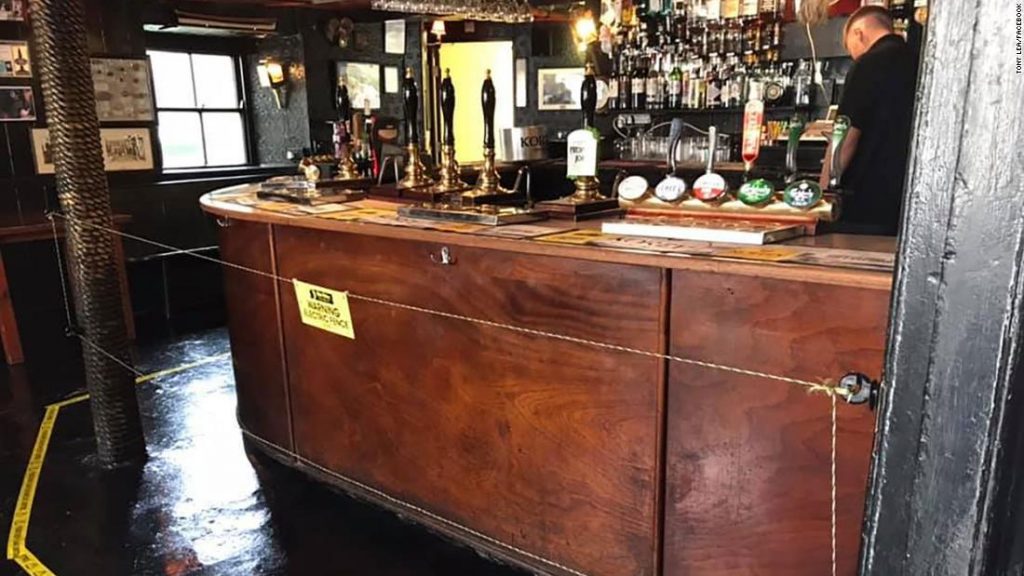
Right then. It’s only Tuesday but we’re going to leave you at this point, for next week there begins a whole new adventure.
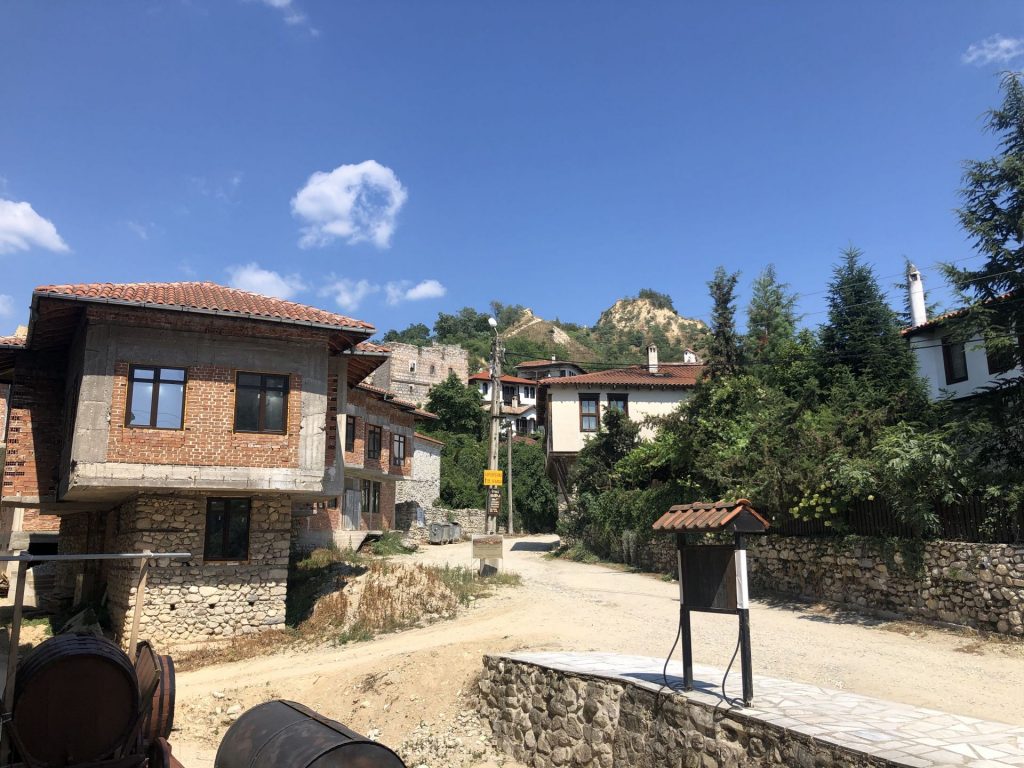
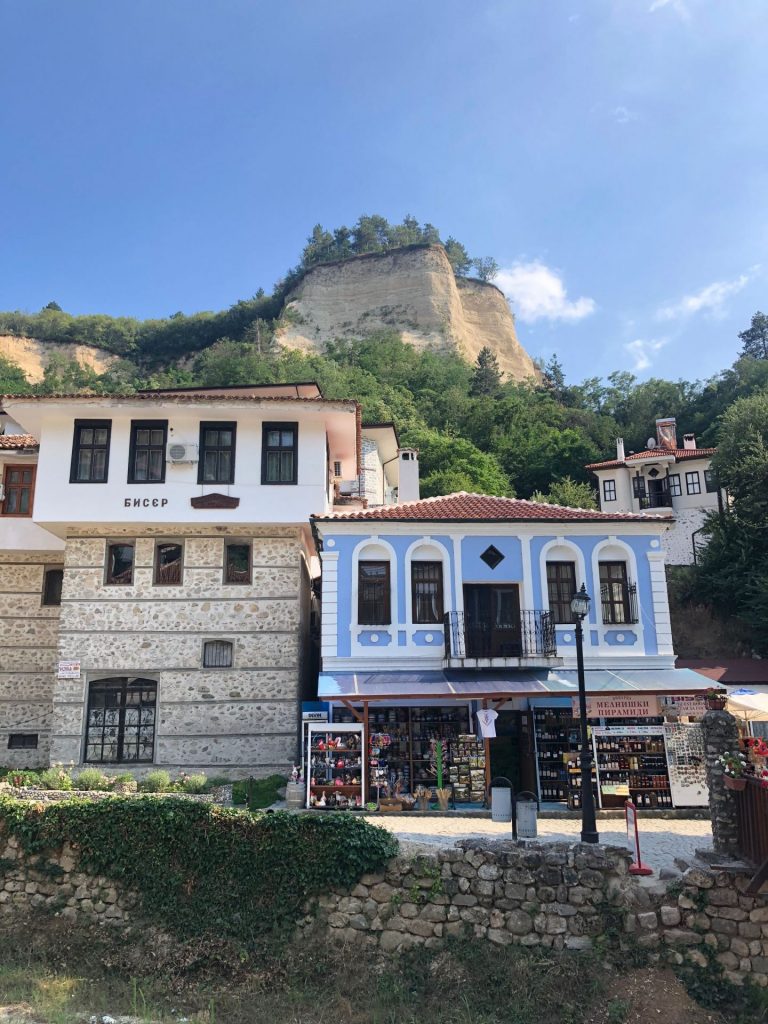
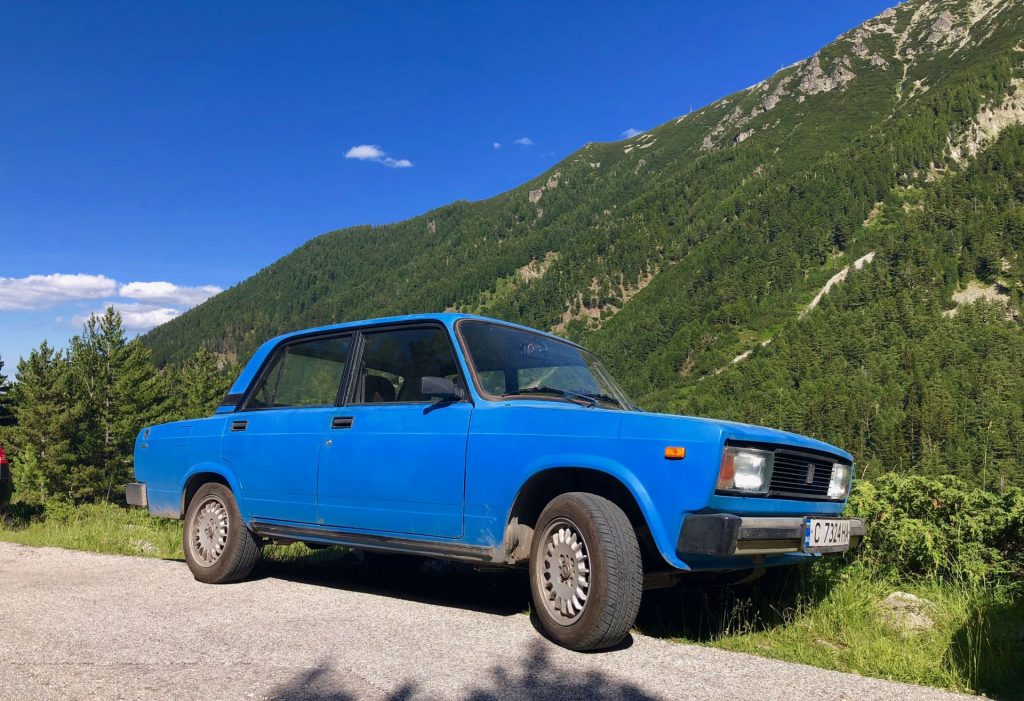
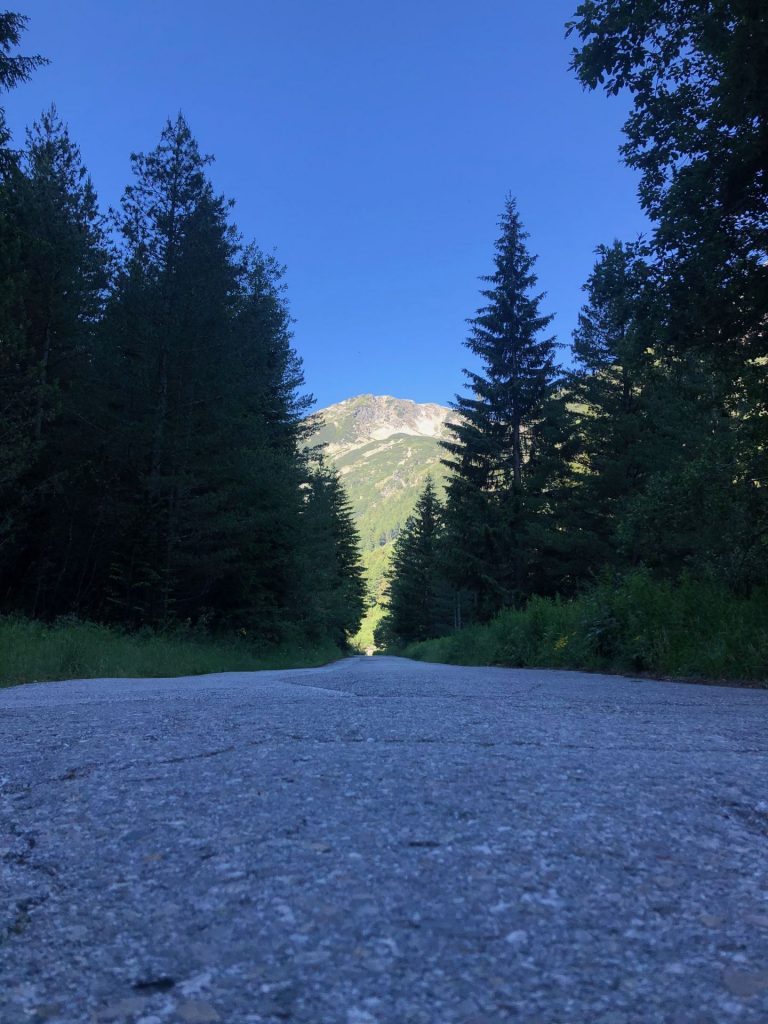
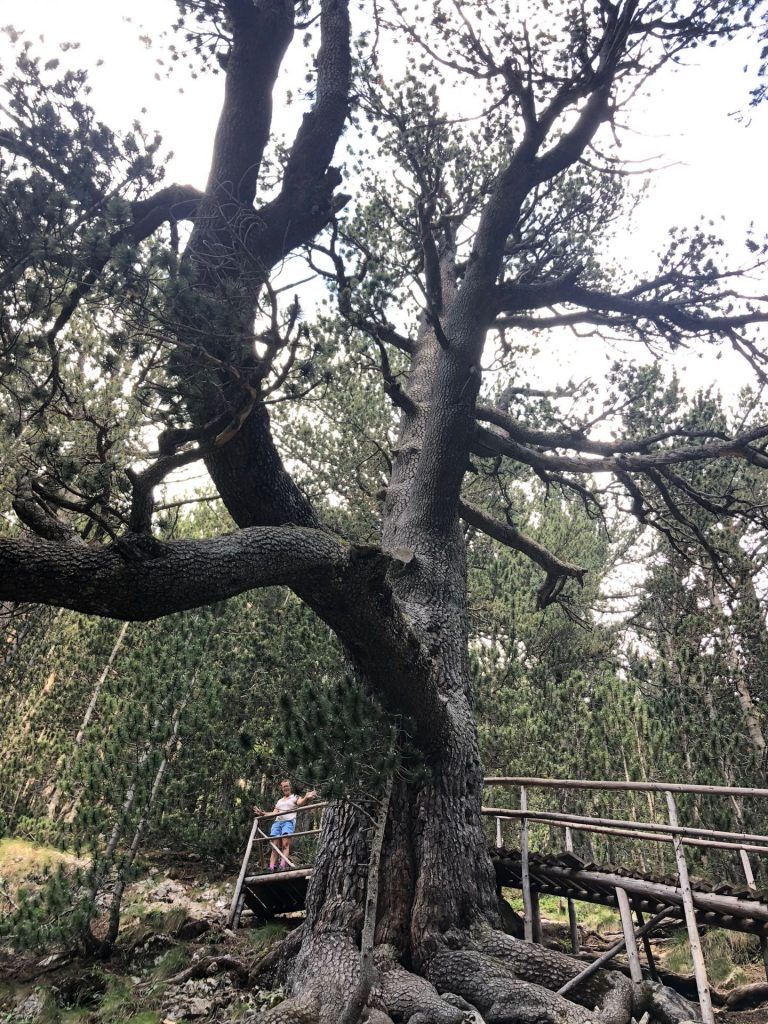
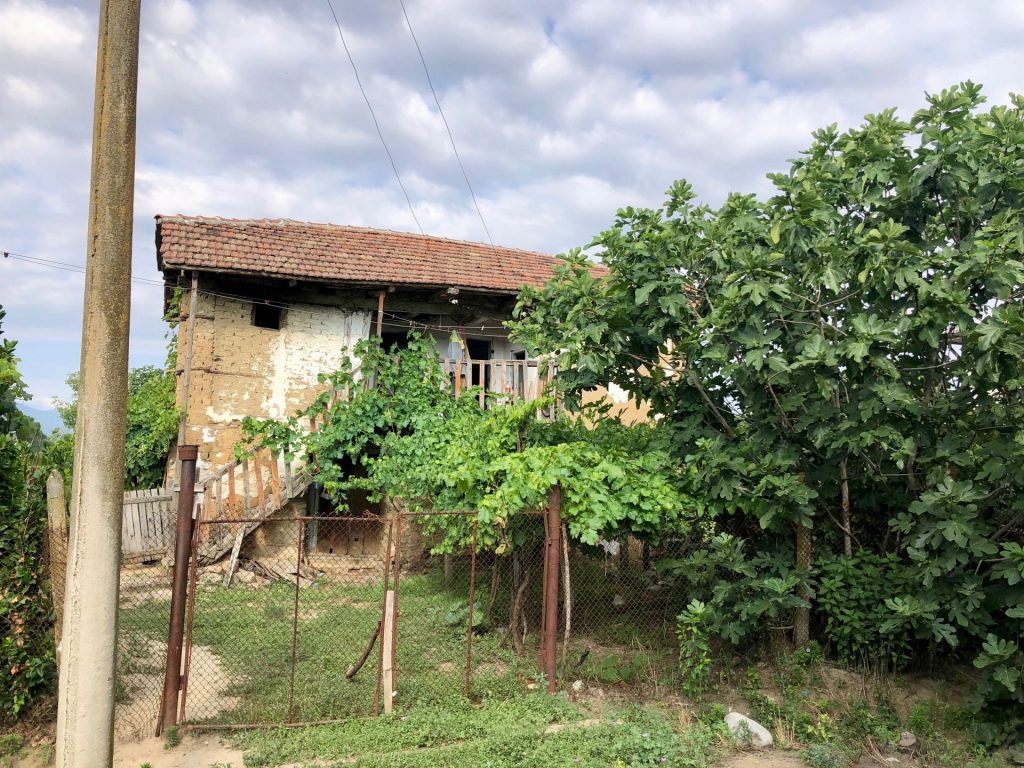


Wonderful pics ,,your worries about borders make my recent trip to B&Q seem trivial although similar but on a bigger scale ,,we wore our face masks and stood in a long line two meters apart thank god we don’t have to go again for awhile ,,Bulgaria looks wild and very beautiful ,,we love old buildings but don’t think led like to stay in one ,,shame you didn’t get your room for the night but get the wine helped ,,
Yes your local has made the headlines so funny we love the Cornish humour ,,and st just is a village that is like no other ,,stay safe and sleep well ,,
Wow this place is different.
It feels very foreign but more of an adventure because of that.
I’m with you on the masks. I understand the need (even if it’s only to send a signal) but I find them disorientating let alone hot and hard to breathe with.
It’s obligatory in stores here, but we won’t be doing much shopping.
Look after yourselves
Building with clay blocks has a tradition in the area I come from. Following building traditions of Slovakia and Jemen pastor Gustav von Bodelschwingh introduced this cheap but labor-intensive building technique between WW I and II. The clay walls became durable with two layers of lime plaster and the houses had an excellent room climate. Some pictures of the building process on https://heimstaette-duenne.de/.
My grandparents house was build that way. I guess the buildings on your photos had a similar plaster that expired.
Thanks Margret.
Imagine a building project like that with 50 people working at the same time! I find it hard enough with only five.
Some of the houses are now being insulated on the outside and then plastered and the difference in appearance is dramatic.
Nonetheless most village houses do look like they should be condemned.
Great to see and hear you having a cracking time. Well deserved. Some great photography too. You constantly open my eyes to parts of the world I’m unlikely to visit in the flesh. However your blog certainly helps to portray the local reality. Keep it up, enjoy and I’ll treat you both to pie n pint when you eventually decide to come back to uk.
Chris
Good to hear from you.
This is certainly not your average trip, and here in Bulgaria we’re learning fast.
Pie and a pint? We’ll be there.
KC
Great informative blog and wonderful photo’s, I suppose like most of the old Soviet Block countries they are gradually having a less regimented existence. Regarding face masks, I had occasion to go to the Freeman in Newcastle for bloods to extracted and it was of course obligatory to wear one. I just found the whole experience disenchanting and by the time I could take it off once outside the hospital it was hot and damp. We are soon to be obliged to wear them in shops and supermarkets, which will entice me to buy online even more. (Mr Tesco is bringing goodies as I write!!)
Safe travels as your onward adventure continues.
Grrr. Masks disorientate me.
Minty finds it hilarious, but I seem to lose all coordination when I’m wearing one.
Our knackered high street doesn’t stand much chance of recovery does it?
Riveting stuff ! I like the different perspective you offer on a country we think we know but we really don’t. There seems to be a more adventurous streak in your latest peregrinations. Are you learning more about human nature, including your own 🙂 ?
T.
The trouble is that today we think we’re travelling when we’re only on holiday.
Even on this three year journey I know that we have often only scratched the surface of the places we have been to.
Bulgaria is the most foreign place in Europe. While some might say that Romania is similar, it’s much easier to understand Romanian as a Latin based language. Bulgarian is hard!
Mark Twain had many great quotes about travel. My favourite is “Travel is the enemy of bigotry”. If more Britains travelled they wouldn’t have wanted to leave Europe.
If we all took time to understand each other better there’d be less hated.
The hard thing about writing the blog is keeping it short – and it’s already long!
You’re singing Running Up That Hill to me now as I write this.
Thank you. KC